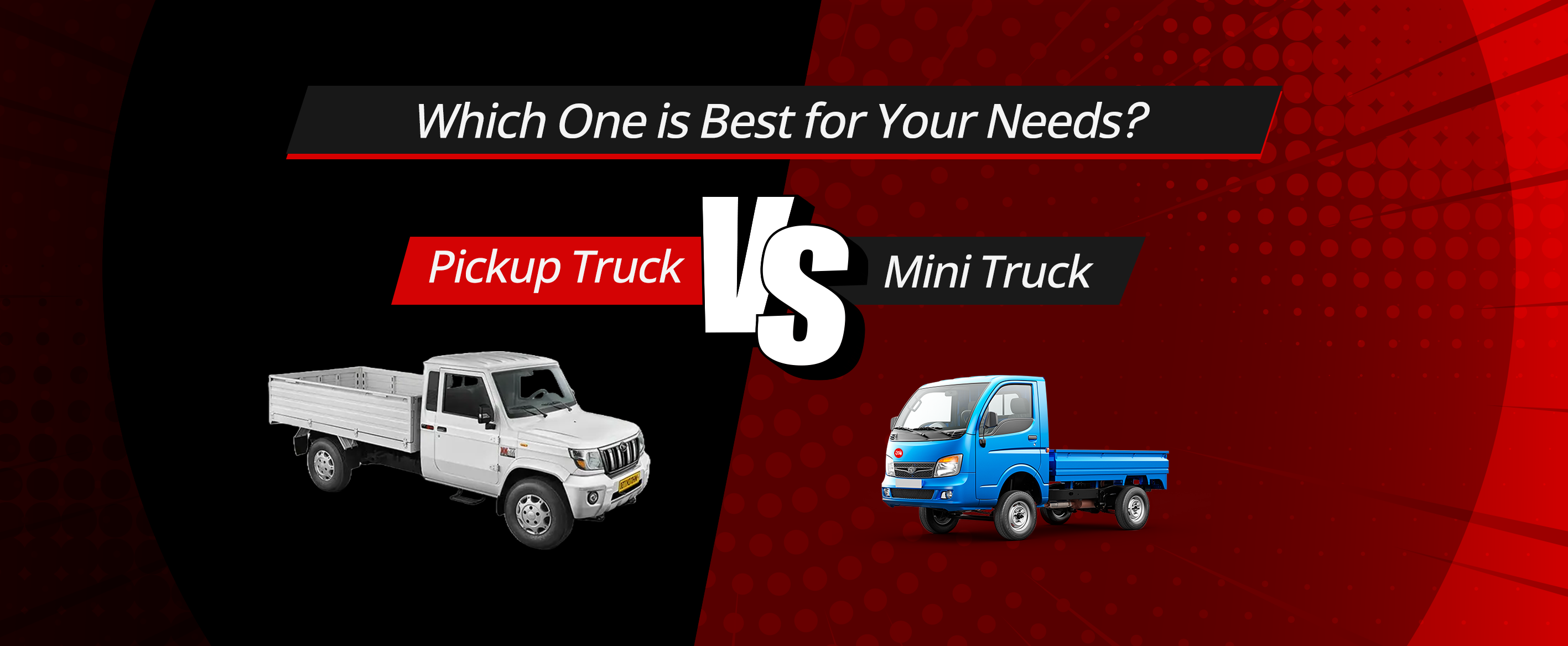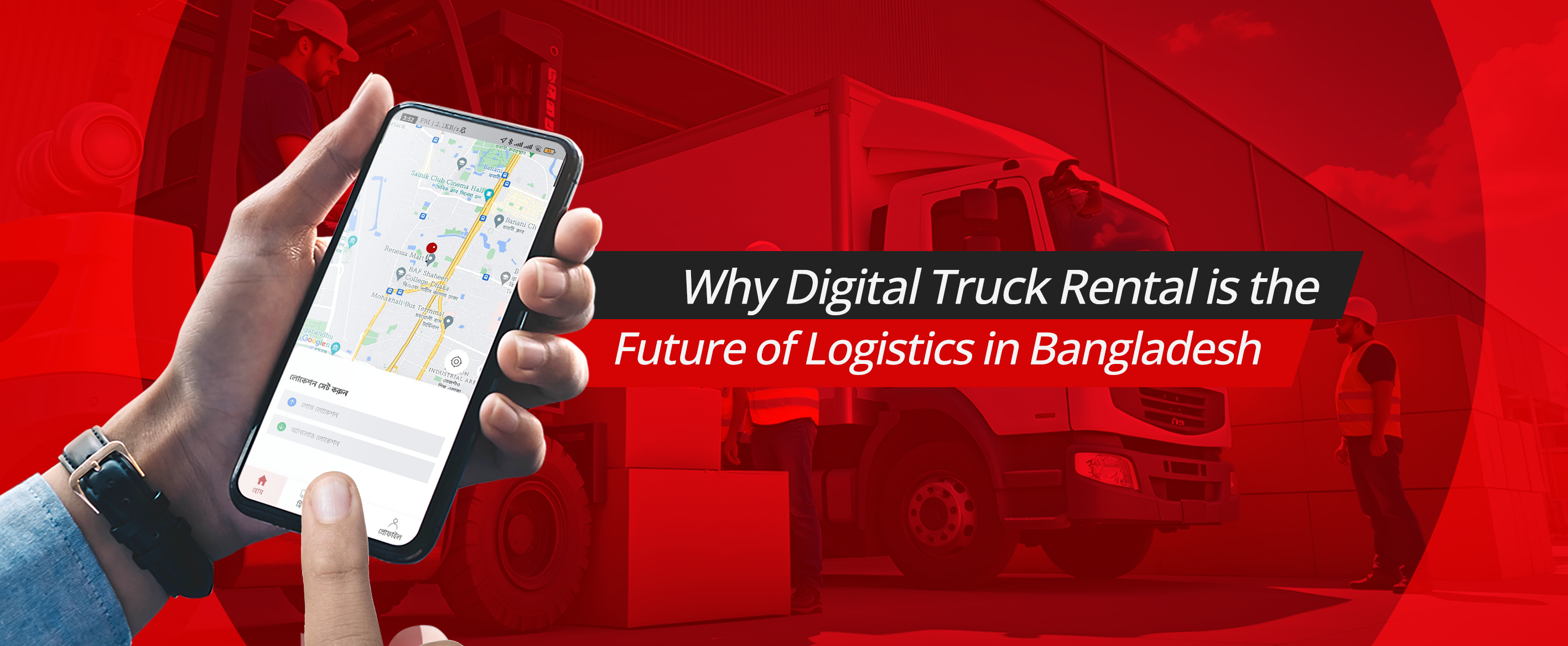
Choosing Between a Pickup and a Mini Truck: Which one should you select?
- On April 05, 2025
The right vehicle is not always easy to find, especially when it comes to multipurpose vehicles like pickup trucks and mini trucks. Picking the right truck can make a significant difference in the success of your business, regardless of whether you are a small business owner or a farmer.
Both mini trucks and pickup trucks have their unique advantages and limitations. However, which one best suits your requirements? Do you require a tiny, fuel-efficient vehicle for small-scale transportation such as lightweight furniture, raw vegetables, fish, meat, other city deliveries, etc, and bachelor shifting? Or are you searching for a vehicle that can manage hefty loads, heavy furniture, garments, cosmetics, family shifting, etc, and off-road trips? To make an informed choice, it is crucial to understand the strengths and weaknesses of each truck. In this blog, let's examine the main distinctions, their benefits, and practical uses in this post to assist you in selecting the truck that best fits your needs with us.
What is a Pickup Truck?
Pickup vans are light-duty trucks with an enclosed cabin and an open cargo bed at the back. Due to their durability and power, these trucks are popular among construction workers, off-road enthusiasts, and businesses that require heavy-duty transportation.
Key Features of Pickup Trucks:
- Strong chassis and suspension for handling heavy loads.
- High-powered engines for towing and hauling.
- Available in multiple sizes, including half-ton, three-quarter-ton, and one-ton variants.
- Off-road capabilities with four-wheel drive (4WD) options.
- Spacious cabins with advanced comfort and technology features.
Advantages of Pickup Trucks:
- Power and Performance: Capable of towing large trailers, boats, and heavy machinery.
- Versatility: Suitable for work and recreational purposes.
- Durability: Built to last with strong frames and high ground clearance.
- Resale Value: Pickup vans hold their value longer than many other vehicle types.
Best Use Cases for Pickup Trucks:
- Construction and heavy-duty hauling.
- Off-road and adventure travel.
- Farm and agricultural transport.
- Businesses that require frequent long-distance transport.
- Transferring large household items from one home to another.
- A furniture and appliance delivery service.
What is a Mini Truck?
The mini truck, also known as a Kei truck in Japan, is a compact, lightweight vehicle used for small-scale transportation. As a result of their affordability and efficiency, these trucks are widely used in urban areas, farms, and small businesses.
Key Features of Mini Trucks:
- Small engine size, usually between 600cc and 1,500cc.
- The lightweight frame with excellent fuel efficiency.
- Compact dimensions for easy maneuverability in tight spaces.
- Available in various configurations, including flatbeds, dump beds, and enclosed cargo beds.
Advantages of Mini Trucks:
- Fuel Efficiency: Consumes significantly less fuel compared to full-sized trucks.
- Affordability: Lower initial cost and maintenance expenses.
- Compact Design: Easy to park and drive in congested areas.
- Customization: Many models can be modified for specific business needs, such as food trucks and delivery vans.
Best Use Cases for Mini Trucks:
- Small business deliveries and logistics.
- Urban and municipal transport services.
- Agricultural and farm-related tasks.
- Maintenance and light construction work.
- Ideal for last-mile delivery of retail and e-commerce packages.
- A cost-effective option for small-scale home relocation and furniture moving.
Comparison: Pickup Truck vs. Mini Truck
Selecting the right truck for personal or professional purposes can be difficult, most especially when choosing between a pickup van and a mini truck. The distinct benefits that each truck type offers meet various purposes. It is critical to understand the key differences between these trucks.
1. Size & Storage Capacity
- Pickup Truck: Larger and offers more cargo space.
- Mini Truck: Smaller and best for moderate loads in urban environments.
2. Fuel Efficiency
- Pickup Truck: Higher fuel consumption due to size and engine power.
- Mini Truck: More economical with excellent mileage.
3. Performance & Power
- Pickup Truck: Built for tough terrains and heavy loads.
- Mini Truck: Ideal for light transport and short trips.
4. Maneuverability
- Pickup Truck: Great for highways and open roads but challenging in tight spaces.
- Mini Truck: Excellent for city use and navigating narrow streets.
5. Maintenance & Cost
Generally, pickup trucks or vans command a higher price than mini trucks due to their enhanced design, comfort features, and brand value, though specific pricing fluctuates based on several factors. Base prices for pickup vans are typically elevated due to advanced features, superior interiors, and often, more powerful engines, while mini trucks prioritize affordability for utility and heavy load capacity. Maintenance costs follow a similar trend, with pickup trucks incurring higher expenses due to sophisticated suspension, advanced technology, and brand-specific parts, in contrast to the simpler, more cost-effective mechanics of mini trucks. Fuel efficiency tends to favor mini trucks, designed for heavy loads at lower speeds, whereas pickup vans can consume more fuel depending on engine power and usage. Finally, while pickup trucks are more expensive initially, they often retain a higher resale value due to their versatility for both personal and business use, whereas mini trucks, primarily used for commercial purposes, typically have lower resale values. Consequently, mini trucks offer a budget-friendly option for cargo transport, while pickup trucks provide a more versatile and comfortable, albeit pricier, solution for mixed-use needs.
- Pickup Truck: More expensive upfront and higher maintenance costs.
- Mini Truck: Budget-friendly with lower maintenance expenses.
Let us explore through some real-life examples such as;
Rahim’s Construction Business – Pickup Truck
Rahim Shaheb, a construction business owner, requires a vehicle that would be effective for the transport of tools and materials. Given the scale of his operations, where raw materials and construction equipment are not excessively heavy, the strength and durability of light commercial vehicles such as the Ashok Leyland Dost and the Tata ACE EX2, both 7-ft, 1-ton pickup vans, are ideally suited to his daily operational needs. These vehicles provide a practical and efficient solution for his logistical requirements.
Ayesha’s Home Shifting – Covered Mini Truck
Ayesha is a housewife who is preparing for a relocation to an urban place with her husband. And, they have selected a Mahindra Big Bolero. It is a covered mini truck that facilitates the move. Given their small family size and moderate furniture volume, the 9-ft, 1.5-ton capacity of the truck is a perfect choice. The compact dimensions of the Big Bolero offer significant advantages, allowing for easy navigation through congested urban streets and contributing to lower fuel consumption. Furthermore, the truck’s maneuverability simplifies parking and enables efficient, rapid transport of their belongings.
Kamal’s Urban Carpentry Business – Mini Truck
Kamal, a carpenter running a business in an urban area away from Dhaka, uses a JAC or JMC 12-ft, 2-ton mini truck for his daily operations. His business involves transporting heavy furniture to customers, requiring a reliable vehicle that can handle large loads while remaining fuel-efficient. The mini truck is an ideal solution due to its affordability and ability to maneuver through tight city streets.
Which Truck is Right for You?
Choose a Mini Truck If:
- You need a truck with high towing capacity.
- Your work involves frequent travel on rough or unpaved roads.
- You require a strong, long-lasting vehicle for business and personal use.
- You frequently move large furniture or heavy household items.
Choose a Pickup Truck If:
- You need an affordable, fuel-efficient vehicle for urban deliveries.
- Your business involves frequent stop-and-go trips.
- You require a compact vehicle that fits into tight parking spots.
- You are moving to a new home on a budget or need to transport small household goods.
Each has its strengths and weaknesses, and the choice largely depends on what you need it for. In this article, we will break down the differences, advantages, and best use cases for both so you can make the best decision.
You should choose between a pickup truck and a mini truck, depending on your needs, budget, and work environment. The advantages of mini trucks are their power, durability, and cargo capacity, making them a great choice for businesses that require heavy-duty transportation. Furthermore, pickup trucks are space-saving and economical solutions for small-scale transport and urban deliveries. Be sure to consider your daily transportation needs and financial implications before you make a purchase. Picking the right vehicle for your business or personal projects will help improve efficiency, reduce costs, and enhance productivity.
For those looking for additional options, a pickup van could be a viable alternative for medium-sized loads, and consulting with a reputable truck company can help guide your decision.
Categories
Recent Posts
- ENJOY UP TO TK1,250 DISCOUNT (4%) BY USING PROMO CODE: CARRY25
- ENJOY UP TO TK 1,500 DISCOUNT (4%) BY USING PROMO CODE: BIGMOVE25
- How Mr. Afzal Unlocked Great Profit With Truck Lagbe’s 18 Feet Truck Feature!
- How to Book a Shifting Service Using the Truck Lagbe App
- ENJOY 5% DISCOUNT (UP TO ৳500) BY USING PROMO CODE: DARUN25
Know Before You Transport Goods: Essential Truck Booking Tips

How Digital Truck Rentals Are Transforming Logistics in Bangladesh


